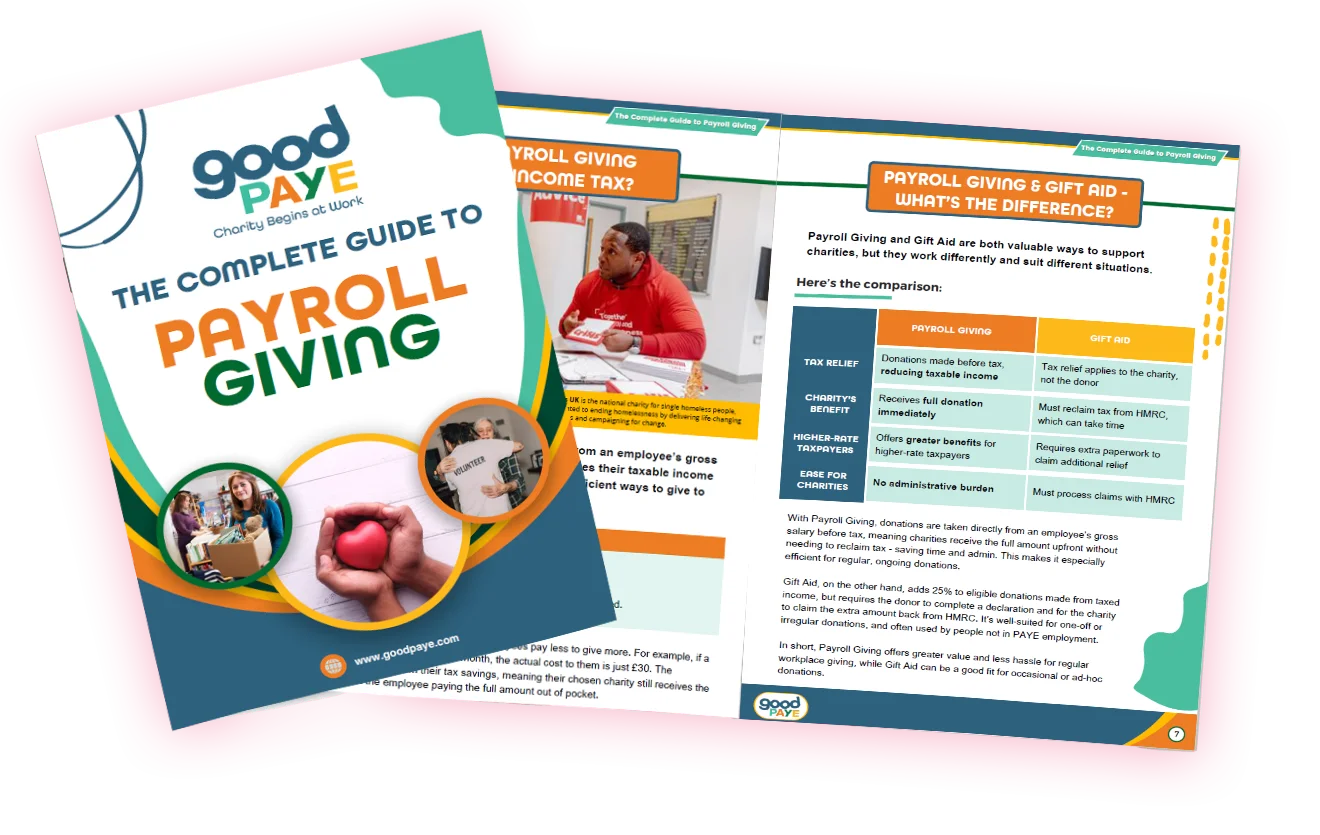After filling in the form, we'll give you a whistle stop tour of our platform, showing you how easy Payroll Giving is to get set up.
Payroll Giving Explained: Everything employers need to know >>

Top Employee Perks Your Company Should Offer
Alice Wright, GoodPAYE
Looking for the best employee perks your company should offer as part of an employee package? From mandatory benefits like pensions and annual leave, to free employee perks that cost nothing but boost morale, the right package makes a huge difference to staff retention and recruitment. Below, we’ve broken down the most popular staff perks, the core offers every worker expects, and some unique workplace perks that will really set you apart.
Keeping staff motivated, loyal and (dare we say) cheerful on a Monday morning, is a tough ask, and a competitive salary isn’t the whole story.
Employers with a compelling value proposition know that the right blend of employee perks can be a deciding factor between attracting top talent or watching them stray to a competitor with better biscuits!
Not all company perks are created equal. Some are legal requirements, some are ‘old hat’, others are everyday essentials, and others still are the kind of quirky extras that get people posting on LinkedIn.
So let’s explore the top perks offered in UK workplaces today…
Give your employees a perk that gives back, through Payroll Giving
Download your free guide here
Everything employers need to know about running a payroll donation scheme.

The most popular employee perks
UK employees tend to be surprisingly practical about their perks. Forget gimmicks like office slides or branded stress balls – what employees really want are added extras that make everyday life easier, healthier and a bit less stressful.
According to Perkbox’s Great Perk Search, the most in-demand benefits focus on flexibility, wellbeing, and real-world savings.
Here are the clear favourites:
- Flexible working – Hybrid, remote, four-day weeks, or simply shifting hours to dodge the rush-hour chaos. In the post-Covid era, it’s the undisputed champion of workplace perks. Nobody wants to spend two hours on a rainy commute just to log into Zoom from a grey cubicle!
- Extra paid holiday – Birthdays off, early finishes on summer Fridays, or a full office closure over Christmas. These little extras feel like gold dust to employees, and they don’t go unnoticed. Some companies even offer “duvet days” for when you can’t face life without your slippers.
- Wellbeing support – Once limited to a dusty fruit bowl in reception, wellbeing initiatives have levelled up. Staff now expect gym discounts, access to counselling, meditation apps or even onsite yoga. But it’s less about looking good in lycra and more about mental health, stress reduction and finding balance.
- Learning & development – Training budgets, LinkedIn Learning and support for professional qualifications all top the list. Ambitious employees want to see growth opportunities, not just endless PowerPoints. Companies that excel here are the ones that genuinely help staff progress their careers, not simply offer an annual refresher on excel for the whole team (yawn!). Instead, they work with each individual to devise a training plan that matches their aspirations.

Which workplace perks are now expected as standard?
Interestingly, some perks that once felt generous have now crossed into “bare minimum” territory. Staff simply expect them, and if you don’t provide them, you risk looking behind the curve.
- Workplace pensions – Auto-enrolment is the law, but offering more than the minimum 3% employer contribution shows you’re serious about long-term financial wellbeing. It’s one of those employee perks that no one talks about over lunch, but everyone quietly compares. Match contributions and you’ll set yourself apart. Simply offering what’s required and you’ve nothing to shout about.
- Enhanced sick pay – SSP is the legal minimum, but let’s be honest: it doesn’t cover much. Employers who top this up win instant loyalty. Because no one wants to feel punished for catching the office cold.
- Annual leave allowances – The statutory 28 days is fine, but competitive holiday allowances (with the option to carry over or buy more) are increasingly the norm. Nobody brags about 20 days’ holiday on Glassdoor after all.
- Life assurance – True, it’s not as exciting as “Free Prosecco Fridays,” but it’s a thoughtful safety net for employees’ families. And sometimes these quieter staff perks can be conspicuous by their absence.
✨ By blending both categories—perks that thrill and perks that are simply expected—you create a package that ticks all the right boxes.
Employees get the flexibility, time off and wellbeing support they crave, while still feeling secure with the foundations like pensions, holiday and sick pay.

What free employee perks can UK employers offer?
Here’s some good news for employers: you don’t need to splash out on luxury retreats in the Cotswolds or hire an in-house masseuse to keep your people happy. Some of the most effective employee perks are completely free (or so cheap they barely dent the budget). These freebies are often the ones that feel the most genuine, because they show thoughtfulness rather than just money thrown at the problem.
Here are some simple but powerful ideas:
- Recognition and praise – A consistent “thank you” culture can work wonders. Whether it’s a Slack shout-out, an email from the boss, or a public nod in the team meeting, recognition is one of the most underrated staff perks. It costs nothing, but it pays dividends.
- Volunteering time – Giving staff a day or two off each year to support local causes is a brilliant workplace perk. Whether they’re painting a community centre or walking dogs at a rescue shelter, they’ll come back energised and appreciative.
- Internal social groups – Encouraging staff to form clubs and interest groups is a perk that builds real community without costing a penny. From running groups to book clubs, five-a-side football to baking circles, these informal gatherings give people a chance to connect beyond their job titles. They create stronger bonds across teams and help new starters settle in faster, all while making work feel like more than just a place to clock in and out.
- Mentorship schemes – Pairing people up in a structured mentorship programme can be transformative. It helps junior staff grow faster, gives senior colleagues the chance to share their expertise, and fosters a culture of learning. Mentorship costs nothing more than time and organisation, but it shows employees that their development matters. In turn, that investment pays back in engagement, loyalty, and sharper skills across the business.
✨ Quick-Win Free Perks Checklist
Want to try this tomorrow?
Here are five free employee perks you can introduce instantly:
1. Let staff finish early on a Friday once a month.
2. Begin meetings with quick shout-outs for good work.
3. Start a “pass-it-on” book or podcast swap — everyone brings a favourite and shares it with the team.
4. Set up a quick-fire mentorship coffee chat — pair two people at random for a 15-minute catch-up.
5. Give everyone one volunteering day per year, no forms or faff.
And because these are company perks that don’t break the bank, they’re also super easy to keep running year after year.

Novel company perks that set employers
Once you’ve nailed the basics, it’s time to think bigger.
These are the employee perks that turn heads, spark LinkedIn posts, and have job applicants saying, “Ooh, that’s different.” The truth is, lots of company perks are now so common they don’t really stand out. Unlimited coffee? Every office has a kettle. Pizza Fridays? Fun for a while, until someone starts insisting on pineapple!
Novel staff perks are the ones that show creativity, inclusivity, and a willingness to go beyond the obvious.
Here are some of the most effective (and memorable):
- Family and fertility support – Covering IVF treatment, adoption leave or menopause support is both progressive and deeply meaningful. This proves you’re serious about inclusivity, and bolster positive sentiment better than beanbags in the breakout room ever could.
- Pet-friendly offices – Letting dogs join the team is guaranteed to boost morale. Yes, you’ll get the odd barking conference call, but nothing breaks up the 3pm slump like a wagging tail.
- Work-from-anywhere schemes – Go beyond hybrid working and allow staff to spend a few weeks a year working abroad. Picture your marketing manager dialling in from Barcelona, or your developer debugging code in Cornwall. They’ll share the experience with friends and family, and you’ll retain top talent. After all, employees are more willing than ever to hand in their notice to go in pursuit of adventure. But you can enable that, without losing months of time (and thousands of pounds) sourcing their replacement. Wifi is readability available pretty much anywhere these days!
- Experience days – From spa breaks to adrenaline-packed skydives, these perks create memories instead of clutter. Let’s face it, nobody’s ever told their mates, “Guess what, I got another branded mug!”, but they will share the weekend adventures they undertook, thanks to their generous company incentive. And they’ll work harder to earn it too!
✨ Wow-Factor Perks
If you really want to stand out, here are some more unique employee perks businesses are experimenting with:
1. Paid sabbaticals every five years—travel, learn, or just nap.
2. Innovation funds: give staff a small budget to test their own ideas.
3. Monthly cultural outings—cinema trips, theatre nights, or even escape rooms.
4. “Life admin hours”: an afternoon off each quarter to sort boring-but-important things like the dentist or MOT.
These are the company perks that spark conversations, attract talent and give your organisation a competitive edge when everyone else is offering the same old benefits.
Watch on demand:
Payroll Giving Webinar
In this short webinar, we cover:
The impact Payroll Giving has
How employers can make a difference
What you can do to drive social change
The most well-used perks (that don’t gather dust)
Some perks sound brilliant on paper but, in reality, end up gathering dust – sometimes literally (hands up if you’ve ever seen a lonely foosball table sitting untouched in the corner of an office.) The truth is, the most valuable employee perks are the ones people actually use week in, week out.
Here are the perks that regularly deliver real value to UK staff:
- Cycle-to-work schemes – It’s been around for years, but it’s still hugely popular among local employees who want to go green and get a little fitter. Staff save money on bikes and gear, the planet thanks you, and everyone gets a little healthier. And as an added bonus, there are fewer grumbles about car park spaces.
- Season ticket loans – With train fares rivalling the cost of a small car, helping staff spread the cost of commuting is one of the most practical staff perks out there. City-bound employees, in particular, love this.
- Discount platforms – Everyday savings on things like supermarket shops, cinema tickets, or high street coffee chains. Discounts get used constantly because they tie into normal life. And who wouldn’t want 10% off the weekly grocery shop?
- Payroll Giving – A brilliantly simple way for employees to support charities straight from their pay packet. It’s tax-efficient, hassle-free and gives staff a feel-good factor that lasts far longer than free pizza ever will. You could even go further and match donations, to really demonstrate your commitment to giving back.
These employee perks are sticky. Meaning they become part of daily routines, not one-off gimmicks. So, if you want to invest in perks that deliver maximum bang for your buck, this list is a strong place to start.

What mandatory employee benefits must UK employers provide?
Before you dive head-first into quirky company perks like office dogs and duvet days, be sure to cover the basics. Some employee perks aren’t optional, they’re set in law. Miss these, and you won’t just have grumpy staff; you could have the HMRC or an employment tribunal knocking on your door (and that’s one meeting you certainly don’t want in the diary).
Here’s a quick guide to the mandatory staff perks every UK employer must provide:
- Workplace pension – All eligible employees must be automatically enrolled into a workplace pension scheme. The legal minimum in the UK is 3% from the employer and 5% from the employee, but many organisations boost their contributions to stay competitive. It may not be as exciting as free cinema tickets, but it’s one of those long-term workplace perks that staff really value (usually once they hit 40 and suddenly get very interested in retirement savings).
- Paid annual leave – UK employees working full-time are legally entitled to 28 days’ paid holiday per year (this can include bank holidays). Anything less is non-negotiable. Many employers go further, offering extra days for long service, birthdays, or office shutdowns at Christmas.
- Statutory Sick Pay (SSP) – If an employee is too ill to work, you’re legally required to provide SSP from the fourth day of absence (up to 28 weeks). It’s not the most generous allowance, which is why many companies now offer enhanced sick pay as an additional perk.
- Maternity, paternity and adoption leave – These are legal rights, not favours. Eligible employees must be given paid leave for these life events. Savvy employers go beyond the minimum, offering enhanced parental leave, which goes down extremely well with staff starting or growing families.
If you don’t offer these mandatory employee perks, you’re not just “behind the times”, you’re breaking the law. Think of them as the sturdy foundation, so don’t go including them on job ads unless you’re going beyond what’s required to ‘top them up’.

Which employee perks really matter?
The truth is, there’s no one-size-fits-all list of the “best” employee perks. What matters most is balance. Cover the mandatory staff perks (like pensions, annual leave, and parental rights) so you’re legally compliant. Layer in the core company perks people now expect (like enhanced sick pay, flexible working and wellbeing support). Then sprinkle in a few free employee perks and some creative extras to keep things fresh.
By offering a mix of practical, meaningful and memorable workplace perks, you’ll build a package that attracts top talent, keeps staff engaged and helps people feel genuinely valued. After all, the most effective company perks are about making life easier, fairer and a little more enjoyable for the people who keep your business running.
Nobody ever stayed at a job just for the ping-pong table, but plenty will stick around for flexibility, recognition and the feeling that their employer actually values their contribution.



